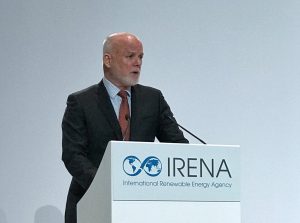As delivered
Remarks by Peter Thomson, President of the 71st session of the UN General Assembly, at Closing Ceremony of 7th Assembly of IRENA
15 January 2017
Ministers
Excellencies,
Distinguished guests,
Ladies and Gentlemen,
It is an honour to address the seventh session of the Assembly of IRENA. Thank you for inviting me
Your deliberations over the last day and a half come at a critical time for our world.
As we meet, global average temperatures are continuing to rise each year. With almost two-thirds of global carbon emissions emanating from the energy sector, and over 80 percent from fossil fuels, the need to accelerate a global energy transition to cleaner, renewable sources, could not be clearer.
Securing a sustainable future for humanity is, however, within our reach. The 2030 Agenda for Sustainable Development, the Addis Ababa Action Agenda, the Paris Climate Agreement and a number of other key agreements adopted over the last 18 months, provide a universal masterplan to create a safer, more inclusive, and more prosperous world.
However, the implementation challenges are immense.
They will also require all partners – across government, the United Nations, civil society, business, and the academic and scientific communities – to forge new ways of partnering, mobilizing resources, driving research and innovation, and directing investments into low-carbon and sustainable sectors.
It is in this context that your discussions here in Abu Dhabi have been so important.
Driving the transformation of our energy system will lead to the implementation of Sustainable Development Goal 7 on Affordable and Clean Energy. By meeting Goal 7 we will achieve universal access to electricity and the end of energy poverty, we will propel the greening of economies, will drive achievement of the Paris Agreement, and will gain a multiplier effect for all other Sustainable Development Goals.
While there still is a long way to go, your discussions here over the past days, combined with the data presented by IRENA, show there is good reason for optimism.
We should celebrate that we have achieved a record three hundred and five billion dollars in investments globally in renewable energy in 2015. And we should celebrate the way prices on renewable energy have come down in recent years and have achieved competitiveness with fossil energy in some markets.
With a strong push for scaling and speeding up the transformation required, I believe it possible for us to double the renewable energy share of the global energy mix to 36% by 2030. This will be required if we are to stay well below the 2 degree target called for by the Paris Climate Change Agreement.
You have discussed a wide range of issues, which, combined, contribute to creating the needed momentum, such as:
- scaling up the ambition of nationally determined contributions to meet the Paris Agreement;
- scaling up of private financing;
- scaling up the transformation of power generation, and the use of heat to power and gas to power;
- the potential for a transformation of road transport and other modes of transport;
- the catalysing of off grid- power generation that benefits the poor;
- mobilising investments in renewable energy for Africa and the SIDS that will help all those where the business case is not straight forward or the perceived risk of the investment is high;
- the creation of a global renewable energy guarantee scheme;
But there is a need to do even more in light of the urgency that our timelines demand.
First, we must establish regulatory frameworks that create enabling environments for business – by addressing access to finance issues, risk mitigation, incentivizing investment in renewable energy, and streamlining planning procedures.
This is essential to ensuring that green investment becomes the best business.
This needs to be done at national, regional and global levels to create markets that drive solutions at scale and bring down prices so that these solutions become affordable to all including the poor and those living in least developed countries and small island states.
Second, we must introduce policies that encourage innovative public-private partnerships, and drive research into renewable energy technology, while they discourage ineffective policies and subsidies that create perverse incentives.
And third, we need to roll out education programmes to raise awareness of the importance of renewable energy, and to shape consumer behaviour.
Of course, achieving a transformation of the global energy sector requires international cooperation, requires harmonised standards, capacity-building, technology transfer, and the exchange of best practices. And to this end, fora such as the annual sessions of the Assembly of IRENA are invaluable to catalysing collaboration, and driving cooperation in the field of renewables.
Excellencies,
Ladies and gentlemen,
As President of the General Assembly, I am committed to driving a universal push for meaningful progress in implementing the 17 Sustainable Development Goals, and to ensuring that issues relating to affordable and clean energy and climate change remain high on the global agenda.
World leaders have set a timeline of 13 more years for the international community to transform our world and set it on the right path towards sustainability. However, addressing climate change is an imperative that requires action on a far shorter horizon.
Your work to free humanity from high-carbon energy models, and to provide universal access to clean and affordable energy sources, is critical work that cannot be delayed.
I wish you all the best in your efforts to drive a global energy transformation that will be central to securing the future of our children, grandchildren and future generations of humanity on this planet.
Thank you.


